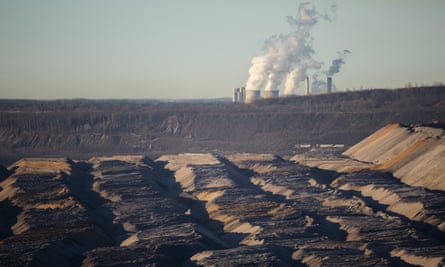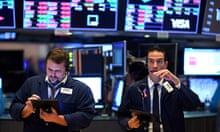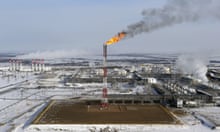Supposedly environmental stock market indices used to help investors allocate hundreds of billions of pounds in investments include some of the world’s biggest contributors to fossil fuel pollution.
Index providers including FTSE Russell, MSCI, S&P Dow Jones Indices and Stoxx all run indices that take into account environmental, social and corporate governance concerns known as ESG.
FTSE Russell, owned by the London Stock Exchange, says it has a “hard exclusion” for coal companies from its FTSE4Good ethical indices, after it was decided that the most-polluting major fossil fuel did not fit its criteria for a sustainable future. However, major coal producers including BHP and Anglo American are included because they are listed as “general mining” firms rather than coal companies.
FTSE Russell refused to provide the Guardian with a full list of index constituents but publicly available factsheets indicate that 34 oil and gas related companies account for 3.4% of the FTSE4Good developed index by market capitalisation.
The inclusion of major oil and coal companies on indices is likely to prompt concerns about the term ESG being used to “greenwash” the reputations of major polluters.
The New York-headquartered MSCI claims that investors worldwide have used its ESG indices to direct well over £200bn in investments since 2014. Fund managers such as Blackrock and Vanguard sell investors products such as exchange-traded funds, which track the performance of ESG indices.
Savers whose money is invested using these indices may be unaware that they are funding fossil fuel extraction, said Charlie Kronick, a senior climate campaigner at Greenpeace UK.
“In today’s world, many people buying products labelled ‘4 Good’ may expect that a fund created to take into account environmental impact would not include oil or other fossil fuel companies,” he said.
“The stark reality is that to achieve the targets of the Paris agreement and avoid huge impacts on billions of people as well as massive biodiversity loss, there will have to be drastic changes to the way we power our societies, move around, grow much of our food and look after the natural world. Including oil companies in funds that are marketed as protecting the environment won’t help that transformation – it will slow it down.”
Some index providers argue that ESG indices can be used to give greater weight to those companies which do better than their peers on various sustainability issues. Linda-Eling Lee, global head of ESG research at MSCI, told the Guardian this “competitive logic” can give companies incentives to improve their operations. MSCI’s indices favour those companies that “are actually paying attention to these emerging or latent ESG risks”, she said.

All of the index firms provide detailed methodologies for their indices, assigning clearly defined ESG scores to companies. However, the scoring systems used by some indices only count direct and indirect carbon dioxide emissions, such as those from company vehicles or offices – ignoring the much larger emissions from burning fossil fuels extracted by energy companies, known as scope 3 emissions.
David Harris, the group head of sustainable business at the London Stock Exchange Group, said scope 3 emissions calculations are not suitable for index creation.
“Scope 3 is a great concept but if you want to use it for investment purposes there’s very little data,” he said.
FTSE Russell’s aim instead was on “raising the standards over time” by engaging with companies on the indices on their environmental practices, with the threat of them being thrown off if they do not improve, he said.
He ruled out excluding the entire oil and gas sector from FTSE4Good indices, saying divestment from those companies would mean forfeiting the ability to bring investor pressure to bear. Spokespeople for MSCI, S&P Dow Jones and Stoxx also cited engagement with companies as a key reason for retaining polluters on indices.
All of the index providers argued that they offer investors choices for how they structure their portfolios and that it was not their responsibility to rule out entire sectors. The index firms do offer sub-indices that exclude fossil fuel producers and they run profitable and growing businesses that can produce bespoke indices for investors.
Catherine Howarth, the chief executive of ShareAction, a campaign group, said: “It’s daft that these oil, gas, and mining giants are allowed to be labelled as businesses with ‘strong environmental practices’ when their whole business model is predicated on extracting and burning fossil fuels. This speaks to a wider need for regulatory clarification on what constitutes a green investment but in the meantime a little common sense wouldn’t go amiss.”
She added: “Investment firms and index providers must take responsibility for the products they market to consumers and implement stricter rules for qualifying for ESG indices. So much is at stake.”
Index providers have previously resisted activist pressure to adjust their ESG indices but the activists have also scored some notable successes. Dow Jones Sustainability Indices removed Golden Agri-Resources, a Singapore-listed palm oil company, from ESG benchmarks in December, after Friends of the Earth accused the index of “greenwashing” a company behind deforestation.
“There’s a lot of hiding behind opaque metrics of what sustainability investing is,” said Gaurav Madan, senior forests and lands campaigner at FoE in the US. He added that companies “hide behind [the] idea of engagement” with boards to improve practices.










